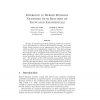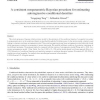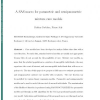218 search results - page 7 / 44 » Simplifying mixture models through function approximation |
NIPS
2007
15 years 3 months ago
2007
Clustering is often formulated as the maximum likelihood estimation of a mixture model that explains the data. The EM algorithm widely used to solve the resulting optimization pro...
134
click to vote
IJAR
2006
15 years 2 months ago
2006
Mixtures of truncated exponentials (MTE) potentials are an alternative to discretization for solving hybrid Bayesian networks. Any probability density function can be approximated...
122
click to vote
CSDA
2007
15 years 2 months ago
2007
This article proposes a Bayesian infinite mixture model for the estimation of the conditional density of an ergodic time series. A nonparametric prior on the conditional density ...
113
Voted
BMCBI
2008
15 years 2 months ago
2008
Background: The inference of a genetic network is a problem in which mutual interactions among genes are deduced using time-series of gene expression patterns. While a number of m...
CMPB
2007
15 years 2 months ago
2007
: Cure models have been developed to analyze failure time data with a cured fraction. For such data, standard survival models are usually not appropriate because they do not accoun...



